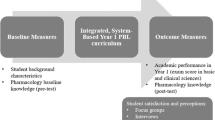Abstract
Integrating basic medical sciences such as pharmacology, into the teaching of medical students is not easy. The material usually provided through lectures and laboratories seems irrelevant to the practice of clinical medicine. The essence of pharmacology can be gleaned from the aphorism: Drug MEETS Body; Body MEETS Drug. The central themes are better learned in the context of clinical problems. Problem-based learning provides one possible avenue. Teachers should realise that medical schools are not the sole repository of wisdom and knowledge nor does learning cease with graduation. Students who learn to seek, synthesise and integrate information will be better prepared for life-long learning.
Similar content being viewed by others
References
Cowen, D.L. (1980). Materia Medica and Pharmacology. In R.L. Numbers (Ed.), The Education of American Physicians: Historical Essays (pp. 95-121). Berkeley, CA: U. Cal. Press.
Cushny, A.R. (1906). A Textbook of Pharmacology and Therapeutics or The Actions of Drugs in Health and Disease (2nd edition, p. 7). Philadelphia, New York: Lea Brothers & Co.
Darby, T.D. (1964). On teaching pharmacology and therapeutics in our medical schools: deliberations upon and a rephrasing of an article by John J. Abel. American Heart Journal, 67, 145-149.
Engelberg, J. (1994). The Nature of Integrative Study. P.O. Box 876, Stillwater, OK: New Forums Press.
Gilman, A.G. (1990). Goodman and Gilman's The Pharmacological Basis of Therapeutics (Eighth Edition). New York: Pergamon Press.
Goodman, L.S., & Gilman, A. (1940). The Pharmacological Basis of Therapeutics (Preface, p. v). New York: The MacMillan Company.
Kuhn, T.S. (1963). The function of dogma in scientific research. In A.C. Crombie (Ed.), Scientific Change: Historical studies in the intellectual, social and technical conditions for scientific discovery and technical invention, from antiquity to the present (pp. 350-352). London: Heinemann.
McPhedran, N.T. (1993). McMaster University, In Canadian Medical Schools: Two Centuries of Medical History, 1822–1922 (pp. 208-215). Montreal, QC: Harvest House.
Salter, W.T. (1951). Medicine as a Science: Pharmacology. New England Journal of Medicine 244, 136-142.
Shin, J.H., Haynes, R.B., & Johnston, M.E. (1993). Effect of Problem-Based, Self-directed undergraduate education on life-long learning. Canadian Medical Association Journal, 148, 969-976.
Spaulding, W.B. (1991). Revitalising Medical Education: McMaster Medical School, The Early Years 1965–1974. Hamilton, ON: B.C. Decker Inc.
Sweeney, G. (1990). Clinical Pharmacology: A Conceptual Approach (pp. iii, 30). New York: Churchill Livingstone Inc.
Tugwell, P., Bennett, K., Sackett, D.L., & Haynes, R.B. (1985). The measurement-iterative loop: a framework for the critical appraisal of need, benefits and costs of health interactions. Journal of Chronic Diseases, 38, 339-351.
Vogel, W.H. (1993). Relevance of “irrelevant” facts in medical education: the value of basic science teaching for later medical practice. Academic Medicine, 68,suppl. S27-28.
Woodward, C.A., & Ferrier, B.M. (1983). The content of the medical curriculum at McMaster University: graduates' evaluation of their preparation for post-graduate training. Medical Education, 17, 54-60.
Author information
Authors and Affiliations
Rights and permissions
About this article
Cite this article
Rangachari, P. Basic Sciences in an Integrated Medical Curriculum: The Case of Pharmacology. Adv Health Sci Educ Theory Pract 2, 163–171 (1997). https://doi.org/10.1023/A:1009763812617
Issue Date:
DOI: https://doi.org/10.1023/A:1009763812617



